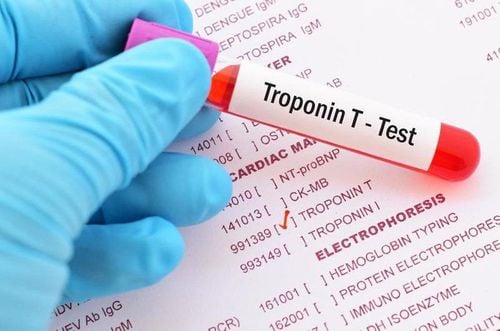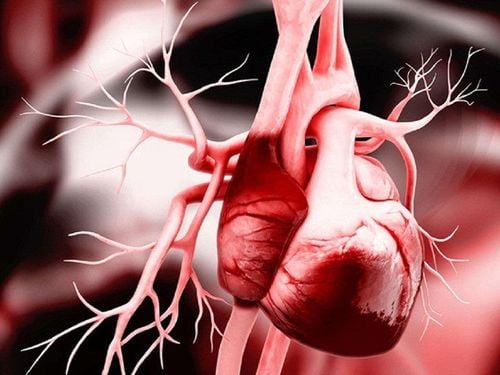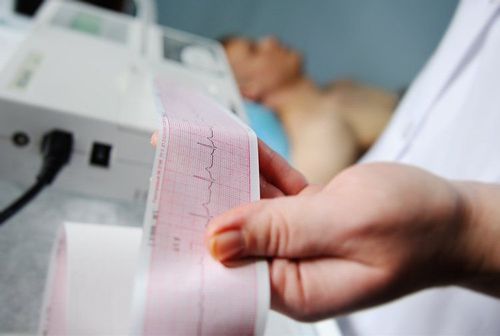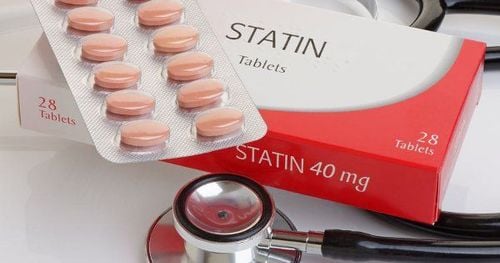This is an automatically translated article.
The article was consulted with Dr. Nguyen Van Duong - Interventional Cardiologist - Cardiovascular Center - Vinmec Central Park International General Hospital.Myocardial infarction is the death of heart muscle cells due to ischemia. Diagnosis of myocardial infarction is based on clinical symptoms, electrocardiogram, cardiac imaging, and troponin. Troponin is the most valuable biomarker to date for the diagnosis of myocardial infarction.
1. Overview of myocardial infarction
According to the World Health Organization (WHO), cardiovascular disease (CVD) is the leading cause of death globally and is responsible for 45% of all deaths, equivalent to over 4 million deaths. every year in Europe. Therefore, risk stratification, early diagnosis and treatment of myocardial infarction are essential.Acute myocardial infarction is an event resulting from myocardial cell death related to coronary hypoperfusion due to stenosis or thromboembolism (rather than from trauma or myocarditis). Patients with acute myocardial infarction often present with major symptoms such as acute chest pain and ST-T segment electrocardiographic (ECG) dynamics changes. However, a small number of patients have symptoms or ECG changes that are not obvious. Therefore, quantification of several cardiac biomarkers is needed to help with early MI diagnosis, risk stratification, and appropriate reperfusion therapy.
2. Biomarkers in myocardial infarction
There are many biomarkers used for diagnosis, monitoring and prognosis in myocardial infarction.2.1. Troponin (cTn)
Troponin is important for the interaction between actin and myosin, and regulates the contractile function of the cytoplasm in response to calcium and protein phosphorylation in the cell. The troponin complex is located with tropomyosin on the actin filament. Cardiac-specific troponin isoforms such as troponin I (cTnI) and troponin T (cTnT) exist in myocardial tissue, while troponin C is represented in skeletal muscle.Elevated serum troponin levels reflect myocardial damage. Troponin increases 4 hours after the onset of clinical symptoms, which can persist for up to 2 weeks. In some cases of myocardial infarction, there is a slight increase in troponin, which can decrease back to normal within 48-72 hours.
According to consensus on the diagnosis of acute myocardial infarction, the cardiac enzyme troponin T or troponin I must be elevated above the 99th percentile of the limit of normal and there must be a kinetic change (increase or decrease on two tests). 3-6 hours apart) in the appropriate clinical setting. The change in cardiac troponin levels between measurements is more important than single-measurement values, helping to differentiate myocardial infarction from other causes of elevated troponin.
Troponin T and I have similar prognostic value. High cardiac troponin levels are useful for diagnostic purposes and also as an independent prognostic marker, as demonstrated in several clinical trials and meta-analyses. Troponin levels also aid in clinical decision-making as to whether an aggressive or conservative course of therapy should be instituted after acute myocardial infarction. Increased blood troponin reflects myocardial necrosis, but not always myocardial infarction. Other causes of troponin elevation include: myocarditis, heart failure, pulmonary embolism, pericarditis, aortic dissection, transplant rejection, chemotherapy, or cardiac trauma. In addition, troponin may be chronically elevated in patients with severe renal impairment due to the slow elimination of troponin.
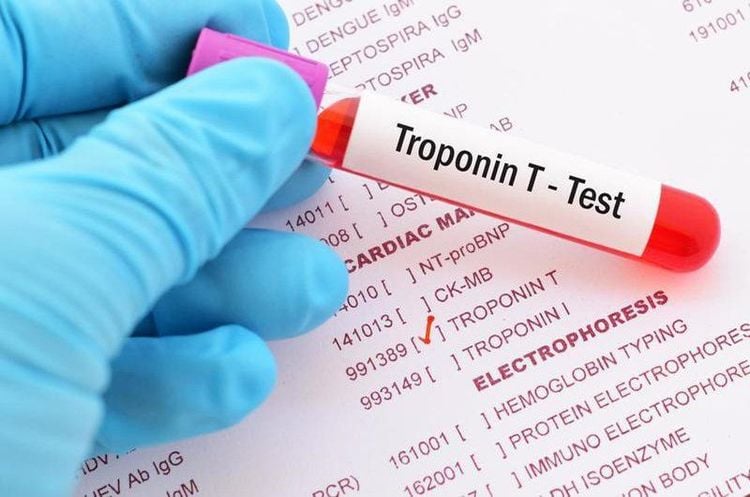
2.2. BNP or NT -Pro BNP
Type B diuretic sodium peptide (BNP) is a hormone secreted by cardiac muscle cells in the ventricles in response to cardiac stress and ventricular dysfunction. After synthesis, the proBNP precursor is cleaved into the active hormone BNP and an inactive NT-proBNP fragment. The functions of BNP include vasodilation, diuresis, and inhibition of the renin-angiotensin-aldosterone system.Serum sodium peptide levels, especially BNP and NT-proBNP, are increased after acute coronary syndrome. Elevated levels of BNP in patients with acute myocardial infarction are also related to the size of the infarct area. Even so, BNP and NT-Pro BNP cannot be used as diagnostic markers because this marker is also elevated in other conditions such as heart failure and pulmonary embolism. Due to the partial renal elimination of BNP and NT-proBNP, patients with renal failure also have high levels of BNP and NT-proBNP.
Several studies have demonstrated the prognostic value of BNP and NT-proBNP in patients with myocardial infarction. Plasma NT-proBNP, measured 2 to 4 days after acute MI, independently predicts left ventricular function and 1-year survival. Increased BNP levels at baseline in patients with STEMI are associated with impaired reperfusion after fibrinolysis and higher 30-day mortality. After adjustment for troponin, BNP remained independently associated with mortality, and rates of heart failure and mortality increased when baseline levels of BNP were high.
2.3. Stock/Security – MB
Creatine kinase (CK) is an enzyme consisting of two subunits, M and B, from which three different isoenzymes are produced, CK-BB, CK-MB and CK-MM. CK-BB is a brain isoenzyme and is present in large quantities in the brain and many internal organs. CK-MB is a cardiac-specific isoenzyme and is the standard for the diagnosis of acute myocardial infarction in many laboratories. It exists in large amounts in the myocardium, but is not completely cardiac-specific and also exists in skeletal muscle and other tissues. Approximately 15–40% of total myocardial CK is due to CK-MB, with the remainder largely due to the CK-MM isoenzyme. CK-MB is not completely specific for myocardial infarction and there are many other causes of elevated CK-MB levels. Heart conditions such as congestive heart failure and arrhythmias lead to elevated CK-MB levels. Severe musculoskeletal injuries such as acute muscle injury, myositis, polymyositis, chronic inflammation, and degenerative muscle disorders can also lead to elevated CK-MB.2.4. Myoglobin
Myoglobin, a low molecular weight cytoplasmic oxygen-binding iron-binding protein, is the most sensitively evaluated biomarker of myocardial infarction. however, myoglobin has a lower specificity for cardiac necrosis than troponin and may be elevated in noncardiac disorders, such as musculoskeletal, trauma, or chronic kidney disease. Despite the lack of cardiac specificity, combining myoglobin with troponin significantly improved the ability to identify individuals at increased risk of death from myocardial infarction compared with individual markers. Myoglobin is primarily eliminated by the kidney, and renal failure has been implicated as a predictor of adverse outcomes, including mortality, in patients with myocardial infarction.
2.5. CRP
CRP is a protein made by the liver when there is tissue damage, infection, or inflammation. CRP is a useful prognostic indicator in patients with acute coronary syndromes, as elevated CRP levels are independent predictors of cardiac death, acute myocardial infarction, and congestive heart failure. Patients with high CRP at admission have a poor first-year prognosis; high chance of recurrence. High-sensitivity CRP levels are correlated with the prognosis of myocardial infarction, stroke, and peripheral embolism. It is the most widely used inflammatory marker in routine clinical practice. However, CRP is a less specific and sensitive biomarker for cardiac injury compared with hs-cTn.In summary, cardiac biomarkers are released into the bloodstream after myocardial cell necrosis. Sensitivity and specificity for cardiomyocyte injury vary significantly among cardiac biomarkers, but cardiac troponin (cTn) is the most sensitive and specific currently the marker of choice for inclusion in the criteria. diagnostic criteria for acute myocardial infarction.
Vinmec International General Hospital is one of the hospitals that not only ensures professional quality with a team of leading medical professionals, modern equipment and technology, but also stands out for its examination and consultation services. comprehensive and professional medical consultation and treatment; civilized, polite, safe and sterile medical examination and treatment space.
Please dial HOTLINE for more information or register for an appointment HERE. Download MyVinmec app to make appointments faster and to manage your bookings easily.
Reference source: pmj.bmj.com





